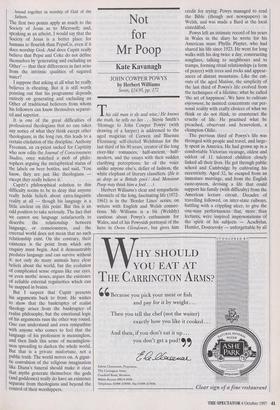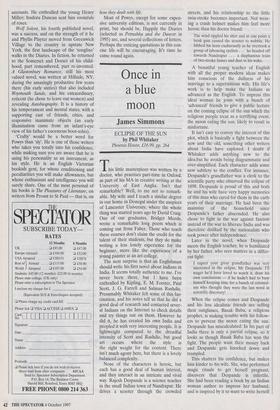Not for Mr Poop
Kate Kavanagh
JOHN COWPER POWYS by Herbert Williams Seren, £14.95, pp. 172 This old man is sly and wised He knows the truth, he tells no lies . . . Stevie Smith's 'Homage to John Cowper Powys' (with drawing of a harper) is addressed to the aged magician of Corwen and Blaenau Ffestiniog: self-elected Welshman for the last third of his 90 years, creator of the long river-like romances, half-ancient, half- modern, and the essays with their sudden clarifying perceptions; he of the voice unlike anyone else's, defier of fashion, the white elephant of literary classifiers. (He is as deep as a British pool 1 And Monsieur Poop may think him a fool . . .) Herbert Williams's clear and sympathetic chronicle of the long, fascinating life (1872- 1961) is in the 'Border Lines' series, on writers with English and Welsh connec- tions. Mr Williams is a bit (Welshly) cautious about Powys's enthusiasm for Wales, and of his Powysish portrayal of the hero in Owen Glendower, but gives him credit for trying: Powys managed to read the Bible (though not newspapers) in Welsh, and was made a Bard at the local eisteddfod.
Powys left an intimate record of his years in Wales in the diary he wrote for his American muse Phyllis Playter, who had shared his life since 1923. He went for long walks with his dog twice a day, constructing songlines, talking to neighbours and to tramps, forming ritual relationships (a form of prayer) with trees and rocks and appear- ances of distant mountains. Like the cut- outs of the aged Matisse, the simplicity of the last third of Powys's life evolved from the techniques of a lifetime: what he called the art of happiness'. We have to cultivate enjoyment, he insisted: concentrate our per- sonal reality with crafty choices of what we think or do not think, to counteract the cruelty of life. He practised what he preached, observant and benevolent, a champion Oldie.
The previous third of Powys's life was thronged with people and travel, and large- ly spent in America. He had grown up in a comfortable Victorian vicarage, oldest and oddest of 11 talented children closely linked all their lives. He got through public school and Cambridge by cultivating his eccentricity. Aged 32, he escaped from an immature marriage, and from the English caste-system, devising a life that could support his family (with difficulty) from the American lecture circuit. Decades of travelling followed, on inter-state railways, battling with a crippling ulcer, to give the one-man performances that, more than lectures, were inspired impersonations of the spirit of his subjects — Aeschylus, Hamlet, Dostoevslcy — unforgettable by all accounts. He enthralled the young Henry Miller; Isadora Duncan sent him roomfuls of roses.
Wolf Solent, his fourth published novel, was a success, and on the strength of it he and Phyllis Playter moved from Greenwich Village to the country in upstate New York, the first landscape of the `songline' walks in the Diaries. In fiction, he returned to the Somerset and Dorset of his child- hood, part remembered, part re-invented. A Glastonbury Romance, still his most valued novel, was written at Hillside, NY, during the amazingly productive few years there (his early sixties) that also included Weymouth Sands, and his extraordinary, reticent (he chose to leave out women) and revealing Autobiography. It is a history of his temperament and mental states, with a supporting cast of friends, cities, and responsive inanimate objects (an early illumination came from an infant's-eye view of his father's enormous boot-soles).
'Crafty' would be a better word for Powys than 'sly'. He is one of those writers who takes you totally into his confidence, while making sure you are aware that he is using his personality as an instrument, as his style. He is an English Victorian bookish gent, for whose conditioning and peculiarities you will make allowances, but whose enthusiasm and intelligence you will surely share. One of the most personal of his books is The Pleasures of Literature, on writers from Proust to St Paul — that is, on how they dealt with life.
Most of Powys, except for some expen- sive university editions, is not currently in print, but should be. Happily the Diaries (selected as Petrushka and the Dancer in 1995) are, and several collections of letters. Perhaps the enticing quotations in this con- cise life will be encouraging. It's time he came round again.











































































 Previous page
Previous page